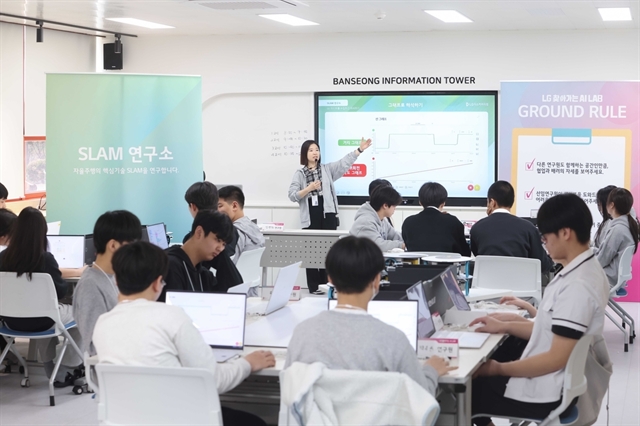 Students at Banseong Middle School in Jinju, South Gyeongsang Province, take part in LG’s mobile AI Lab programme in April. The session introduced students to principles of robotics and computer vision that are usually taught at LG’s flagship AI education centers in Seoul and Busan. — THE KOREA HERALD/ANN Photo
Students at Banseong Middle School in Jinju, South Gyeongsang Province, take part in LG’s mobile AI Lab programme in April. The session introduced students to principles of robotics and computer vision that are usually taught at LG’s flagship AI education centers in Seoul and Busan. — THE KOREA HERALD/ANN Photo
Moon Joon-hyun
South Korea wants to be a world leader in artificial intelligence, but its schools are grappling to prepare the next generation amid confusion concerning what should be taught and, naturally, a lack of qualified faculty to do just that.
In 2022, the Education Ministry announced that coding would become a mandatory subject in middle schools from 2025 and in elementary schools from 2026. The plan was part of a national drive to expand AI talent and prepare the next generation for a digital future.
But classrooms remain far from ready.
The biggest obstacle is the lack of qualified teachers. According to data submitted by the South Korean education ministry to opposition lawmaker Lee Jeong-heon on Tuesday, South Korea has only nine universities with computer education departments, admitting a total of 193 students each year.
When teacher training programs at other universities are included, the nationwide annual intake rises to 434. That is just 11 more than in 2021, despite years of official promises to boost numbers.
“AI talent cannot grow without more qualified computer teachers,” Lee said, warning that the supply of educators has fallen far behind the needs of schools. In practice, many schools assign AI lessons to teachers from other subjects, or rotate one computer teacher across as many as 10 schools.
Even when a teacher is available, textbooks are years behind. The current information studies curriculum was revised in 2022, before the release of ChatGPT later that year. Since then, generative AI has spread rapidly into workplaces, schools and creative industries.
But as one teacher at a high school in Seoul’s Mapo-gu told local media, “Today’s textbooks don’t address generative AI at all. They cover concepts like data analysis and regression models, but these do not match students’ interests or the technologies shaping their lives.”
The teacher added that students now ask why they do not learn about ChatGPT in class, leaving teachers to create their own supplementary materials.
The limited time allocated to computer studies makes the problem worse. In elementary school, the subject accounts for only 34 hours across six years of classes (0.58 per cent of total instruction time). Middle school students receive 68 hours over three years, or about 2 per cent of lessons. High school students may not take any such classes at all, since information studies is an elective.
By comparison, Britain devotes 374 hours, Japan 405 hours and Beijing 212 hours, according to international education data.
Teach coding, generative AI or ethics?
Underlying all of this is a more profound confusion as to what “AI education” should even mean. Some argue it should emphasise coding, while others believe data literacy, generative AI skills or ethics are more important.
The launch of AI tools that can write code has also raised doubts over whether teaching programming syntax alone is still relevant.
“Rather than simply expanding teacher quotas, we need to clarify what skills tomorrow’s educators should impart,” said Korea University computer science professor Kim Hyun-chul. “Teacher training must integrate AI ethics and literacy, not just coding.”
The government has responded by preparing a nationwide AI literacy programme that would cover everyone from preschoolers to soldiers and the general workforce.
The South Korean finance ministry plans to include it in the 2026 budget, funded by raising the education tax rate on financial and insurance firms from 0.5 per cent to 1 per cent. This increase is projected to generate KRW1.3 trillion (US$943 million) annually. — THE KOREA HERALD/ANN